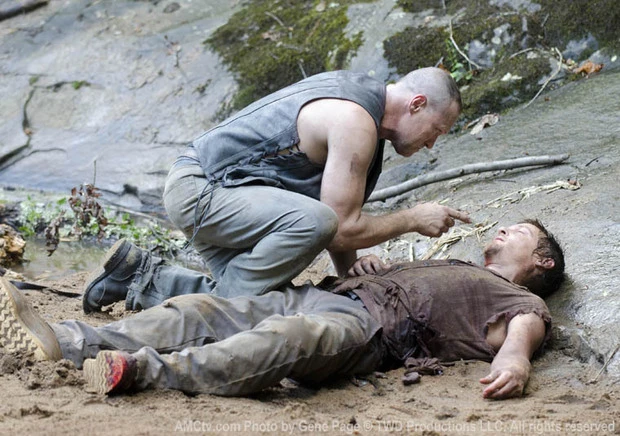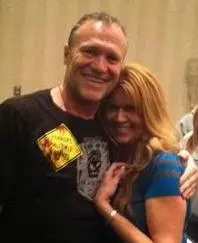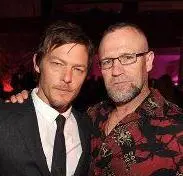Michael Rooker only needed a handful of scenes to turn Merle Dixon into a fanboy favorite. But it was his real-world commitment to bringing the character to life that gave the AMC series its watercooler buzz.

Merle Dixon doesn’t do warm and fuzzy. The maniacal gun-slinging racist and nastier of two redneck brothers on AMC’s genre juggernaut, The Walking Dead, Merle achieved cult status last season after sawing off his hand to escape encroaching zombies. Considering his few scenes, the level of demand for Merle’s return surprised both the network and producers, and might not have happened were it not for the humanizing force of actor Michael Rooker.
Rooker’s recent presence on the show, in the form of a hallucination, was not only Merle Dixon’s long-awaited reentry, but a stellar example of a network tapping into its characters–and their fans–to promote a series about the undead in a fresh way: Throw out just enough meat to appease appetites, but keep ’em hungry. And Rooker, who playfully dodges questions about his next appearance, dove into the scene with humor-laced swagger and improvisation. Coercing his semi-conscious younger brother, Daryl (Norman Reedus) into climbing a steep ravine to safety, not even Rooker knew everything that would spill out of his mouth.
“When I make things my own, that’s when the script comes alive, and that’s part of what makes Merle so memorable,” Rooker says. “I love the uncertainty of doing it as real as I possibly can. I don’t think about how I’m going to play a role. I’m more concerned with what’s underneath and between the words, who the person is, why he’s doing what he’s doing, and if what he’s saying is truthful. And then I let it roll. I equate it to being a jazz musician, who bends, twists, and elongates musical notes so they evolve into something more personal, when you’re pouring your soul into it.”
After nearly three decades in films like Henry: Portrait of a Serial Killer, Cliffhanger, JFK, Days of Thunder, and Slither, Rooker watched his popularity explode after a handful of scenes and a disappearing act last season, prompting three fan groups, a videogame gig in Activision’s Call of the Dead, and an AMC promotional campaign that teased his eventual Nov. 13 return.
From Merle’s ferocious anger in last season’s rooftop fight with the other survivors to the charged irony of his waving a pistol while demanding a democratic vote for himself as group leader, Rooker took pains to avoid affecting a good ol’ boy cliché. But when Merle opened the next episode with a delirious, grasping, four-minute monologue that preceded his hand severing, his dynamic changed. “Merle had been a brash, crazy, loose cannon in the fight,” says Rooker. “This showed you a completely opposite side, and created more questions than answers.”
“What Michael does is literally command the screen in such a way that you can’t look away,” says executive producer Gale Anne Hurd. “He’s completely believable. When he was firing his gun during takes, unsuspecting people in Atlanta were hitting the pavement. I don’t know that another actor would have been quite as convincing. I’m sure, when he encountered people after the show aired, they probably assumed he was crazy, when he’s really a pussycat.”
Which hints at the secret ingredient for Dixon devotion. While Rooker’s embodiment of Merle may have created fans, the authentic way he embraced them created a grassroots promotional force.
 “Merle isn’t a likable character. He’s the one you love to hate. But it’s Mike who makes him interesting,” says Kim Sarem, who founded the Rookerholics. “He knows his craft and you can’t take your eyes off of him on the screen. He’s the same way on Twitter, Facebook, and in real life. He’s Tweeted back and forth with many of us, dozens, if not hundreds, of times. He knows about us, and remembers us, and where we’re from. All of the Walking Dead actors are extremely approachable and grateful for fans, but Mike’s been the most interactive.”
“Merle isn’t a likable character. He’s the one you love to hate. But it’s Mike who makes him interesting,” says Kim Sarem, who founded the Rookerholics. “He knows his craft and you can’t take your eyes off of him on the screen. He’s the same way on Twitter, Facebook, and in real life. He’s Tweeted back and forth with many of us, dozens, if not hundreds, of times. He knows about us, and remembers us, and where we’re from. All of the Walking Dead actors are extremely approachable and grateful for fans, but Mike’s been the most interactive.”
“I talk a lot on a CB Radio, which is a lot like Twitter,” Rooker counters. “I drove to Atlanta for Walking Dead and talked on the CB to pass the time. Truckers gave me the handle Tagalong, cause I’d tag along on convoys.”
Last April, the Rookerholics crafted a Mo Merle Twitter campaign to bring Merle back, aimed at AMC and Walking Dead producers, and enlisting the help of fellow fan group, the Zombie Survival Crew. Dixon’s Vixens joined them on subsequent Twitter blitzes. Rooker and Reedus often tweeted shout-outs to each other. “It was a social networking trifecta, all for getting Merle back on the show,” laughs Rooker.
The furor inspired AMC’s Where’s Merle? Twitter contest promotion at last summer’s San Diego Comic Con, where fans could get pictures taken with a life-size sculpture of Merle (now residing at AMC’s New York headquarters, handcuffed to a ficus tree.)
 “We hoped people would embrace the new characters, since the Dixon brothers weren’t in the comic book,” says Hurd. “But we didn’t know there would be so much Dixon love.”
“We hoped people would embrace the new characters, since the Dixon brothers weren’t in the comic book,” says Hurd. “But we didn’t know there would be so much Dixon love.”
Rooker has responded in kind. He joined the Zombie Survival Crew as its head of special forces, created severed polyurethane hands to dole out to fans at conventions, mentioned the groups in interviews, and instigated the idea for the first Rookerholics meeting at the recent Horrorhound Weekend in Cincinnati, where some two dozen members introduced themselves and explained why they were addicted to Rooker. The best story earned a signed zombie-shaped shooting target. The group was so stoked from the experience, it’s now planning campaigns for a Merle Dixon action figure, a Sons of Anarchy guest spot for Rooker (who rides a Harley for real), and a listing in next year’s People’s “Sexiest Men Alive” issue–none of which they bothered to consult Rooker about first.
All of which Rooker finds endlessly amusing. “We basically have a virtual party going,” he laughs. “Listen, I’m just a regular guy and I have a slightly different perspective than a lot of actors. I survived pretty poor circumstances. I grew up with eight siblings. Our house in Alabama had an outhouse and a dirt floor. When my folks divorced, our mom moved us to a rough Chicago neighborhood. To come from that, and make a life and a career, is pretty tough and takes a lot of fight. It’s made me have to get the job done better than most. And I’m gonna enjoy it better than most.”
[Photos courtesy of AMC, Rachael Tedeschi, and Rachel Griffith]





